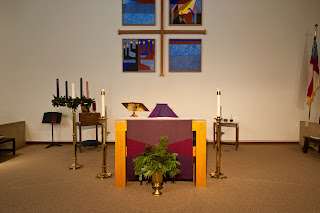
I was reading a remarkable article by Methodist Bishop William Willimon this morning. He was differentiating between being the giver and the receiver, especially at Christmas time. He suggests that, generally speaking, people in our culture are more comfortable with giving rather than receiving. Folks like to give gifts to other people this time of year because, in Willimon's opinion, we enjoy thinking of ourselves as basically generous, benevolent giving people...Christmas is a season to celebrate our alleged generosity." (Willimon, Watch for the Light, page 143."). He adds that "we" (I infer he means educated, somewhat wealthy to wealthy White adults) are better givers than getters not because of our generosity but because of our pride and arrogance. He concludes that such negatively reinforced generosity is completely contrary to the sort of giving the Bible describes as taking place at the very first Christmas.
I think that Willimon is correct in some ways but I don't think our holiday generosity is so much about our pride as it is about our disdain for vulnerability and receptivity. All of us possess some sense, if not a great deal of vanity. The more money that I spend on someone else's gift will make it (and me) more valuable to them. That's one way of thinking, however misguided such manipulation may be. We may also think that the quantitative value of our present is more meaningful than the value of our presence to someone. The folks at Advent Conspiracy suggest this is not the right way of thinking about generosity as Christmas draws nearer. The proper response: spend less on gifts and give more of yourself to those you love.
I'd
 suggest there's an equally if not more important aspect of giving vs. receiving. Mary, Jesus' mother, provides a perfect example of being a recipient rather than a giver. It's not uncommon to hear about Mary's obedience and humility. Both of those traits are assuredly true about her response to Gabriel's announcement of her selection as the mother of The Son of The Most High. However, let's look at her way of being in a different manner. Mary was an excellent recipient of God's Grace. She was willingly vulnerable to accept whatever the future held for her, God's Son, and God as well. Whatever God's will is.... she's willing to let it happen, freely, unconditionally. Would it be as easy for a 15 or 16 year-old girl to respond this way today? What about us? When God calls in this Advent Season, are we so busy shopping for someone else that we miss God's invitation to receive and share Grace rather than worldly goods?
suggest there's an equally if not more important aspect of giving vs. receiving. Mary, Jesus' mother, provides a perfect example of being a recipient rather than a giver. It's not uncommon to hear about Mary's obedience and humility. Both of those traits are assuredly true about her response to Gabriel's announcement of her selection as the mother of The Son of The Most High. However, let's look at her way of being in a different manner. Mary was an excellent recipient of God's Grace. She was willingly vulnerable to accept whatever the future held for her, God's Son, and God as well. Whatever God's will is.... she's willing to let it happen, freely, unconditionally. Would it be as easy for a 15 or 16 year-old girl to respond this way today? What about us? When God calls in this Advent Season, are we so busy shopping for someone else that we miss God's invitation to receive and share Grace rather than worldly goods?Receiving Grace on our parts requires relinquishing control and power over the situations we confront. I think this reality is probably why many Christians speed up and stay busy during Advent, rather than slowing down and just "being." Remaining still and allowing God to be God within us requires a HUGE leap of faith in God's providence as well as an equally large dose of "Letting Go." Non-stop giving, well, this is very charitable activity but it may not necessarily be an extension of God's love as much as we desire it to be.
Bishop Willimon writes "This is often the way that God lov
 es us: with gifts we thought we didn't need , which transforms us into people we don't necessarily want to be. ...this stranger comes to us, blesses us with a gift, and calls us to see ourselves for who we are, empty handed recipients of a gracious God who, rather than leave us to our own devices, gives us a baby." (Willimon, Watch for the Light, page 149.)
es us: with gifts we thought we didn't need , which transforms us into people we don't necessarily want to be. ...this stranger comes to us, blesses us with a gift, and calls us to see ourselves for who we are, empty handed recipients of a gracious God who, rather than leave us to our own devices, gives us a baby." (Willimon, Watch for the Light, page 149.)I share my wishes and prayers for you that you'll live into the Grace of freely and responsibly accepting the beauty and holiness of God's presence in the dwindling days of Advent. May you find at least one opportunity each day between now and Christmas Eve to receive rather than give. Open yourself up to the living possibilities of welcoming the Christ-child into your presence with a somewhat unexpected hope that an angel will find you prepared to faithfully believe in God's surprising Love.
Blessings Along The Way, Jim+




















 I was back home last week and one of the first things that I did was get over to my mom's house to say hello.
I was back home last week and one of the first things that I did was get over to my mom's house to say hello.














